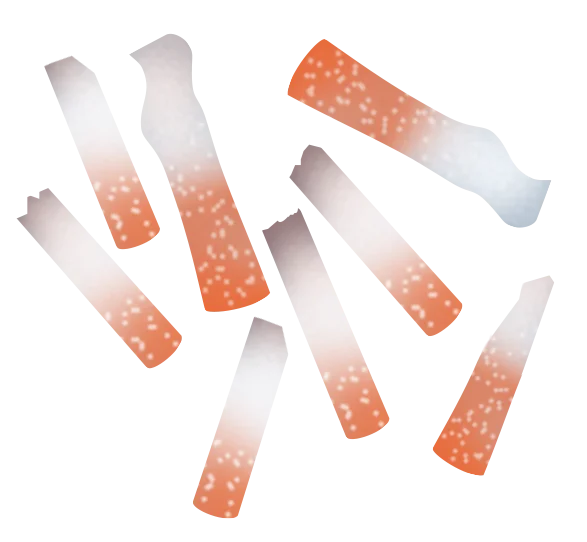
Cigarette butts are the most commonly collected waste during clean-ups organised by Surfrider Foundation Europe. They are also the most harmful pollutant in our urban and coastal environments: veritable eco-toxic bombs that directly threaten the ocean.
Composed of a cellulose acetate filter (plastic treated with toxic substances such as titanium dioxide), paper and tobacco residue, each cigarette butt becomes an environmental poison once discarded. When it comes into contact with water, it releases more than 2,500 toxic chemicals, including arsenic, mercury, lead, tar and pesticides.
Carried by wind and rainwater into sewage systems and then waterways, this waste inevitably ends up in the ocean, where it causes two types of pollution. On the one hand, the filters break down into micro and nanoparticle plastics. On the other hand, their chemicals disperse in the water, directly contaminating marine ecosystems.
The impact is dramatic: inhibition of marine plant growth, deterioration of water quality, and ingestion of microplastics and toxins by aquatic fauna (fish, birds, mammals, turtles), disrupting reproduction, health and behaviour.
We are also working on emerging pollution linked to new tobacco products: in particular, puffs, which are single-use electronic cigarettes, and nicotine pouches, which are packaged in single-use plastic.
Our approach and requests
1.
Ensuring the application of the ‘polluter pays’ principle for the tobacco industry.
Recognised as single-use products, cigarette butts are now included in the European SUP (Single Use Plastics) Directive. This inclusion marks a crucial step in the fight against this specific type of pollution, enabling binding measures to be applied to the manufacturers and distributors of these products.
The programmes developed under this directive aim to make the real polluters – namely tobacco manufacturers and filter producers – responsible for the costs associated with the end-of-life and waste stages of single-use plastic filters.
Surfrider Foundation is actively monitoring the implementation of this extended responsibility for tobacco producers. This monitoring is essential to ensure that the obligations imposed on manufacturers are translated into concrete and effective action on the ground.
2.
Eliminating the problem at its source: banning cigarette filters
Cigarette filters are not just accessories: they are made of plastic (cellulose acetate) and contain high concentrations of chemicals produced by tobacco combustion.
Despite the inclusion of cigarette butts in the SUP Directive, the measures adopted appear insufficient to effectively combat this pollution.
The proof is that cigarette butts remain the most commonly found waste during clean-ups organised as part of Surfrider Foundation Europe’s Ocean Initiatives.
Faced with the scale of this exponential pollution, which shows no sign of abating, our organisation is now calling for a complete ban on cigarette filters.
This radical but necessary position is supported by health NGOs and the World Health Organisation (WHO), which recognise that filters offer no significant health benefits while constituting a major environmental disaster.
This message was amplified during our community’s mobilisation for the ‘Surfrider Against Cigarette Butts’ campaign. This initiative raised massive awareness about the impact of cigarette butts and brought our call for a ban to the attention of policy makers and the general public.
Aware that the tobacco industry is quick to adapt to regulations, we also want to defuse future sources of pollution. That is why Surfrider Foundation Europe is also calling for a ban on puffs (disposable electronic cigarettes) and nicotine pouches, emerging products that risk causing the same environmental disasters as traditional cigarettes.
Understanding the impact of cigarette butts pollution on the ocean and health in figures
Going further
